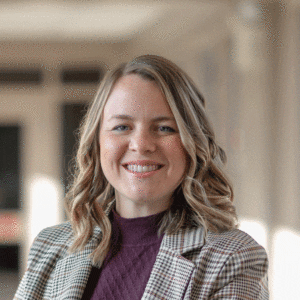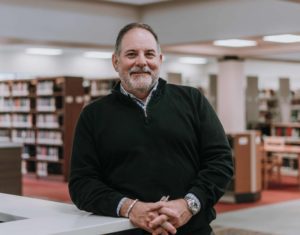The world is throwing an enormously complex barrage of questions at Americans.
First are questions about the justice of wars, from Russia’s war of attrition in Ukraine and the Israel-Gaza war spreading into the Middle East and North Africa to the small incursions of a belligerent China intent on reshaping the world order. What does America owe allies or countries locked in just wars? Is war merely the pursuit of economic opportunities and international prestige?
Artificial intelligence now features prominently in warfare, but it also might alleviate world problems from traffic accidents to incurable diseases. Perhaps, some argue, it could prompt the next stage of human evolution. Others fear it might be used by tyrannical regimes or make all those dystopian movies about the elimination of humans a reality. How should AI be regulated? Will it surpass human intelligence?
AI represents one front of a broader movement within transhumanism that is prompting basic questions about biology. What is a man or a woman? What is marriage or procreation? What does it mean to be human?
The globalized economy adds another layer of stress. It has enabled unprecedented prosperity but tiny fluctuations in its complex supply chain threaten goods from food and lumber to the chips that run vehicles. When a barge becomes lodged in the Suez Canal, sanctions cut off fuel exports, pirates attack ships along the Red Sea, or a pandemic halts shipping, delays and shortages cascade into price increases or recessions. Does the United States have a role in facilitating this global economy? Is free trade moral? Should the U.S. trade with authoritarian regimes?
Meanwhile, the United States finds itself unfit to answer these questions. Cataclysmic mismanagement of the pandemic and lockdowns prompted a year of rioting from discontents on both sides. Political parties now prefer delegitimizing their opponents over allowing normal elections. Faith in American institutions has also hit rock bottom. America’s military has not been this weak since the 1970s, with enlistments, aircraft, naval vessels, missiles, and other materiel reaching record lows. Americans no longer trust doctors, school teachers, police officers, banks, judges, or ministers. Journalists, congressmen, and big business have the lowest marks, earning the trust of only 8–14% of Americans.
America’s future capacity to address these issues also seems jeopardized, with new generations happy to financially cripple their children and grandchildren. Each year, servicing the $34 trillion debt takes more of the budget. Big ticket entitlements like Medicaid, Medicare, and Social Security will become insolvent in less than a decade. Investment in human capital is also below the global average, with American students ranking far below their international competitors in literacy, mathematics, and science.
All of this occurs at a time when America’s universities are trading resources in the liberal arts for business or STEM. Tight budgets and declining enrollment are prompting schools to shift resources toward majors that, some say, provide more tangible skills and a better path to a long-term, high-paying career. Numerous studies demonstrate how this reasoning is flawed and the conclusions incorrect. This has been addressed well elsewhere (see the 26 Oct Forbes article on the subject) and requires no attention here.
More important is the necessity of classes in history, literature, philosophy, and political science for republican government. Republics will rot if ignorance and irrationality creep in. It should be no surprise that as the liberal arts are losing ground, American political life is breaking down.
An educated citizenry does not consist of a collection of individuals who possess specialized knowledge. Since ancient times, autocracies have always needed experts in weapons, warfare, administrative law, engineering, and architecture. Republics emerged when political and military participation expanded to include more citizens, who were expected to be more literate, more civically minded, and more engaged in public life.
The world’s first constitutional order, the Hebraic Republic, broadened participation to an assembly of its fighting men. Ancient Israelite parents were expected to teach their children history, law, and theology, which likely resulted in Israel having the most literate populace of the ancient world. It should be no surprise that this civilization created the world’s preeminent work of literature. The Bible spans numerous fields of knowledge, from annalistic battle accounts, genealogies, and hymns to reflective histories, theology, apocalyptic literature, and breathtaking dramas. It originated amidst a people dedicated to the idea that all knowledge originates with a Creator God who longs to interact with rational humans seeking the truth. Every Israelite citizen was expected to understand, teach, and fight for this idea.
The ancient Greeks distinguished between those arts required to make one skilled at particular crafts, making one valuable and prosperous, and the arts freed from such concerns. Aristotle believed that the latter, the liberal arts, should not be dissociated from practical matters but must rise above them. The citizen educated in the liberal arts believes in fixed truth and the ability of humans to attain it. Plato and Aristotle argued that the search for truth and knowledge had intrinsic value. Knowing the truth and having knowledge makes one a better human being. The wisdom and virtues flowing from the pursuit of truth also help train specialized skills and cultivate social and political skills.
The incubator for this conception of education was Athenian democracy. In Greek democracies and the Roman Republic that followed them, the liberally educated citizen should excel in logic and rhetoric. These were particularly useful for persuading one’s fellow citizens and making compromises between competing factions about justice and the common good. The Roman Republic rose to prominence in the Mediterranean due to its exceptional constitutional system. It was managed by a class of statesmen dedicated to deliberation, public service, and the ability to persuade citizens and allies to act on behalf of the republic.
Rome’s long-lived empire may have collapsed, but the liberal arts lived on. The West continued its preference for constitutionalism with the balance of power between the church’s bishops and the state’s princes. The church’s monasteries preserved the great Latin texts that provided a link with the ancient world, and as kings, nobles, and popes patronized monastic libraries and cathedrals, students began to collect around great teachers and theologians in prominent towns to discuss these texts. Out of this seedbed grew the university.
Universities formed around students and professors committed to the study of great texts. Some universities, particularly in Italy and Southern France, focused on more practical fields such as law or medicine. The University of Paris was the preeminent medieval institution because it focused on theology, seen as the culmination in a liberal arts education. Paris, and other sites such as Oxford and Cambridge, became hotbeds of disputation as philosophers wrangled with how to interpret these great texts. By the end of the Renaissance, over 80 universities throughout Europe served as places to read these texts, discuss their ideas, and apply them to real-world concerns about justice and order.
During the Renaissance, this atmosphere of intellectual competition prompted the greatest minds to seek wisdom from history, philosophy, literature, and art as they faced enormous problems such as foreign invasions, the Hundred Years’ War, the Black Death, and schisms within the church. These disciplines could lift the soul, fortify the mind, and help humans live better lives, which is why they were termed the “humanities.”
A practical goal of the humanities was to seek ancient answers for modern problems, because many of the answers to humanity’s enduring problems have been learned and then forgotten. Some regions, such as Italy, focused on returning to the classical models of Greece and Rome in order to revive ancient republicanism. In Northern Europe, countries like Switzerland, the Netherlands, Scotland, and England blended classical and Hebraic forms of republicanism as the 16th century brought the Reformation and a return to the Hebrew text of the Old Testament.
Out of this context emerged America’s experiment. It was a project centuries in the making, not so much a rebirth as a reincarnation. Just take the two most important documents, the Declaration of Independence and the U.S. Constitution. They are steeped in the Bible; the writings of philosophers like John Locke, Montesquieu, and Adam Smith; and the history of Christendom and the classical world. The ideas of the American experiment, such as mixed government, commercial republicanism, civic virtue, federalism, and the rule of law, were only new in the manner in which they were combined and applied. This is why commentators on these founding documents—from Thomas Paine to the Federalist and Anti-Federalist Papers to early Supreme Court justices—constantly referenced Scripture, the classics, medieval constitutionalism, and Britain’s legal order.
Republics thrive on an educated and properly engaged citizenry. In higher education, the best way to maintain this is through fostering the liberal arts, especially politics, philosophy, and history. Engineers may design a bridge, scientists may develop a vaccine, skilled warriors may win wars, but only those trained in the liberal arts can determine how to resource and where to build the bridge, whether that vaccine can justly be mandated, or whether those wars are just and winnable. This is why the liberal arts must remain the core of any university curriculum, a priority for faculty development, and at the forefront of civic education.
The citizen trained in the liberal arts has read Polybius on the Punic Wars, Fulcher of Chartres on the Crusades, and Clausewitz on modern warfare. He is convicted by Thucydides’ critique of Athens’ democracy when its envoys insisted that “the strong take what they like, the weak concede what they must.” Having read Cicero and Augustine, he instead pursues a just and lasting peace for both victors and losers.
Such citizens understand the benefits as well as the limitations of science. They have read Genesis, Aristotle’s Metaphysics, and Anselm’s Monologion and understand that the truth regarding the human condition or AI can only be found in philosophy. They conceptualize solutions to the global economy by drawing on the ethics of Proverbs and the insights of Adam Smith. They can weigh the arguments of John Maynard Keynes against Friedrich Hayek.
These American citizens do not despair of their republic’s fate, because they know the strengths of its constitution and have the wisdom to see it through its darkest hours. They steel themselves with the Federalist Papers and Alexis de Tocqueville and take inspiration from the speeches of Washington, Lincoln, and Reagan. They will critique their republic when it errs yet are willing to defend their country in the classroom, the public square, and the battlefield.
American civics needs more students who can read any text, regardless of how old or how difficult. It needs graduates trained to see an argument from any angle who can then persuade, negotiate, and compromise with people of different viewpoints. It needs citizens habituated to intellectual humility after hours and hours of reading about the failures, triumphs, and trials of statesmen and civilizations. It needs lifelong learners with the courage to pursue the truth rather than defend their tribe. It needs people who care for their neighbors—regardless of their political differences—because they know we are all human, all capable of error, and all in need of love and justice. American civics needs a people dedicated to the liberal arts.
Dr. Steele Brand is a published scholar and educator who joined the University faculty in 2023 to teach history and politics. He is also a scholar at the Faith and Liberty Discovery Center of the American Bible Society. He previously served as the director of undergraduate fellows for the Clements Center for National Security and as a tactical intelligence officer for the U.S. Army.
Brand’s research focuses on republics in the Western tradition and the citizen armies that fought for them. He has written on this subject in his book, Killing for the Republic: Citizen-Soldiers and the Roman Way of War (Johns Hopkins University Press, 2019). He has also published articles in venues such as Time, USA Today, LitHub, The Washington Post, and The Hill and in journals such as Religions and Humanitas about how this premodern ideal of citizen-soldiers has informed and inspired modern republics, particularly the United States.




